Al-Zaytouna Centre for Studies and Consultations held a conference at the Crowne Plaza Hotel in Beirut on 15/2/2017, entitled “The Issue of Palestine: Strategic Evaluation 2016 – Strategic Assessment 2017.” The conference assessed the developments of various aspects of the Palestinian issue in 2016, and tried to chart the likely trends expected in 2017.
The conference, which consisted of three sessions, was attended by a select of experts interested in the Palestinian issue, who discussed the internal Palestinian affairs, and the Arab, Islamic, and international dimensions of the Palestinian issue, as well as Israeli affairs.
The conference was the ninth edition of an event held annually, to provide a strategic reading of Palestinian developments and issues.
Opening Remarks and First Session
In his opening remarks, Dr. Mohsen Mohammad Saleh, al-Zaytouna General Manager, welcomed the participants and said that as al-Zaytouna Centre enters its 13th year, it has become one of the leading think-tanks focusing on the Palestinian issue. Al-Zaytouna Centre, he continued, insists on committing itself to academic and post-graduate standards and methods, and today serves as an umbrella platform for researchers, specialists, thinkers, and politicians of various backgrounds, to meet and interact in a civilized, academic climate and share the benefits of their various perspectives in the service of the nation and its issues led by the Palestinian issue.
Dr. Saleh then introduced Khalid Mish‘al, head of Hamas’s politburo, who joined via video conference from Doha. Saleh said that Mish‘al’s 21-year leadership of Hamas has steered the group through immense challenges, from al-Aqsa Intifadah, the Palestinian elections that led to Hamas’s victory in the Legislative Council and formation of the Palestinian Authority (PA) government, the national reconciliation dossier, the effort to lift the blockade of Gaza Strip (GS), to managing and defending GS in three wars, and leading Hamas through the waves of changes and revolutions in the Arab region. Saleh noted that Mish‘al has given a distinguished example of leadership, which he is leaving at his prime to clear the way for other brethren in a smooth handover of leadership. He added, “As Mish‘al leaves his post, we are entitled to receive from him his assessment of his experience and struggle.” Saleh then overviewed the key points of the conference program.
Mish‘al presented a keynote address focusing on the Palestinian national experience and Hamas’s role, as well as possible trends and prospects, tackling three main themes:
• Observations and remarks on the Palestinian national experience.
• Observations on Hamas’s role in this context.
• Prospects of the Palestinian issue and Hamas’s role development.
• General overview of the future of Palestinian national action in the coming period.
Regarding the national experience, Mish‘al said that the Palestinian people remain the most important foundation, rather than factions and forces. The Palestinian people, he emphasized, has given its best, showing exceptional heroism and embracing and insisting on resistance. The work of the factions is only a part of the expression and performance of the Palestinian people, Mish‘al explained, adding that it goes to the credit of the Palestinian experience in this stage that it has been able to survive, stand its ground, and continue the work, the struggle, and the resistance.
Mish‘al spoke about Hamas’s role in the Palestinian experience. He noted that although it had officially launched in 1987, this was preceded by ten years of preparation. He said that to Hamas’s credit is that since its launch, it along with other factions had a key contribution in returning the Palestinian resistance to the forefront of the struggle. With huge momentum, and by developing armaments and building a professional army, Al-Qassam Brigades, have “humiliated” the occupation at GS’s border and strengthened the people’s confidence in the resistance against it. Mish‘al also noted the achievements of the resistance, including the capture of enemy soldiers and successful prisoner swaps.
Regarding the future, Mish‘al stressed that there were key priorities, including:
1. Putting the Palestinian political house in order, renewing institutions at home and abroad, and activating the role of the Palestinians abroad at all levels.
2. Redefining the national project and rehabilitating it in agreement with all factions.
3. Palestinian national consensus on a strategy that marries politics with resistance.
4. Managing political, diplomatic, and grassroots decisions and actions jointly among Palestinians in agreement on goals and tactics, integrated with resistance action on the ground.
Mish‘al concluded by saying that Hamas is a key component of the Palestinian issue and arena, and therefore, the four priorities are the same as Hamas’s priorities, with an additional clause: maintaining its program of strengthening its capabilities to the benefit and service of these four priorities.
Second Session
The second session, moderated by Jaber Suleiman, focused on internal Palestinian affairs, Israel and the Palestinian issue, and the Arab world and the Palestinian issue. Speakers included Hani al-Masri, General Director and co-Founder of the Palestinian Center for Policy Research and Strategic Studies —Masarat; Dr. Abbas Isma‘il, assistant professor at the Lebanese University and a specialist in the Israeli issue; and Dr. Ahmad Sa‘id Nofal, professor of political science at Yarmouk University in Jordan and an expert on international affairs and the Arab-Israeli conflict.
In his paper on the internal Palestinian issue, Hani Masri spoke about some changes and developments that will impact Palestinian events, including: Donald Trump’s ascendancy to the White House; internal crises in Arab countries; and the Palestinian situation itself. Masri said that the Palestinian internal situation is in crisis, and is unable to meet challenges and dangers, or turn them into opportunities to end the division, stressing that the restoration of national unity remains a difficult pursuit.
Masri stressed the need to redefine national unity. He noted that vacuum in the Palestinian interior has led to the phenomenon of individual Intifadah, which appears in waves. He said the PA can choose to maintain the status quo, escalate in a limited way, or submit and return to negotiations. The PA could also collapse at some point as a result of Israeli actions. Masri stressed the need to prepare for this scenario, and emphasized the importance of national choice and preparation for full confrontation, calling for real partnership.
In his paper on the Palestinian issue and Israel: developments and future trends, Dr. ‘Abbas Isma‘il indicated that the election of Donald Trump is the most important development for Israel vis-à-vis the Palestinian issue. He said that the developments that have influenced the Israeli approach to the Palestinian issue include the decline of the Intifadah, the continuation of PA’s political paralysis, the election of [Yahya] Sinwar in GS, the usage of the relationship with Qatar and Turkey to open channels with Hamas, and the situation in GS.
Isma‘il said that the Israelis will attempt to take advantage of the absence of a political horizon, the economic and leadership crises in the PA territories, and the tough economic situation in GS. At the end, he underscored the absence of any prospect for a political settlement, and the presence of a major bet in Israel on the possibility of cooperation with the Arab states.
Dr. Ahmad Sa‘id Nofal’s paper tackled the Palestinian issue and the Arab world: developments and future trends. He noted that Arab interference has hurt the Palestinian issue more than it has benefited it. He said that the Palestinian issue has experienced delicate circumstances and developments after the Arab revolutions, with the unrest in the Arab world adversely affecting the Palestinian issue and giving more pretexts to the Arab regimes to justify their failures on Palestine.
Nofal said the Palestinian issue has declined in importance even in the lexicon of Arab regimes, and expressed concern that the US may put pressure on these regimes to fully abandon the Palestinian issue.
Nofal denounced the fact that the largest Arab nation [Egypt] is imposing a blockade on GS, stressing that the Arab peoples remain aware of the nature of the conflict and are in opposition to the Israeli enemy. He considered the real danger is in the Arab official normalization with Israel. Finally, Nofal warned of dubious attempts to make 2017 the year the Palestinian issue is liquidated.
Third Session
Speakers during the third session, moderated by Bashar Shabaro, general secretary of the Arab Publishers’s Association, included Dr. Talal ‘Atrissi, professor of Sociology of Education and Social Psychology at the Lebanese University; Dr. Sa‘id al-Hajj, a specialist in the Turkish issue and member of the Union of Palestinian Poets and Authors; and Dr. Magdi Hammad, President of the Lebanese International University in Beirut.
‘Atrissi said in his paper on Iran and the Palestinian issue that 2016 had these main features:
1. The continuation of regional conflicts and external interference.
2. Negative developments with the decline of the Palestinian issue and increased Arab normalization with Israel.
3. Positive developments with the Jerusalem Intifadah and a UN Security Council resolution condemning settlements.
4. For its part, Iran was preoccupied with wars and conflicts in its surroundings.
‘Atrissi said that when the resistance strengthens, Iran and other countries step up their support for it. He also noted that Iran pursues a constant policy of supporting the rights of the Palestinian people, and is committed to supporting resistance against Israel, setting Iran apart from other countries in this regard.
Regarding Iran’s relations with Palestinian resistance factions, he noted that relations with Hamas have cooled markedly in recent years, but the two parties have been trying to mend their relationship.
‘Atrissi said the priority now is to the conflicts in Iraq, Syria, and Yemen, with the prominence of the Palestinian issue possibly slipping down further as a result. There is a possibility of a war on GS that will aim to strike down the capabilities of the resistance, he added.
For his part, Dr. Sa‘id al-Hajj spoke about the relationship between Turkey and the Palestinian issue, the developments and future trends, in addition to the restoration of diplomatic ties between Turkey and Israel in 2016 and the events that led to it. He said that the general Turkish position on the Palestinian issue had retreated somewhat. Hajj then specified two major changes of relevance:
1. The election of Donald Trump. Turkey has been optimistic about Trump’s elections, after relations with the US deteriorated to unprecedented lows under Obama. Turkey then judged that Israel could be one of the keys to strengthening relations with Washington.
2. The emergence of a presidential system in Turkey, which may have some positive implications for the Palestinian issue.
Regarding the challenges to be expected in 2017, they can be summed up as follows, according to Hajj:
1. The threat of Turkish popular normalization with Israel as well as official.
2. Gas in the Eastern Mediterranean: Turkey needs energy and wants to diversify its sources of imports, by importing from Israel, too.
3. The international situation and the impact of the new US administration policies in the region.
Dr. Magdi Hammad then addressed the international impact, especially that of the US, on the Palestinian issue, stating that the importance of this influence has grown dramatically in line with what happened with South Africa under apartheid. Based on Hammad’s thesis, the local, regional, and international balance of powers suggests that the just solution will stem from abroad.
Hammad said that it has become imperative to conduct a review of Palestine’s international position before things reach a point of no return, especially in light of the disadvantageous developments over the past short period, the result of wars and fragmentation and division in the Arab countries. The year 2016 saw a number of international developments concerning Israel, and those of Israel’s interest were:
1. Presidency of the legal committee at the UN.
2. Cultivating strategic relations with Russia.
3. Restoring relations with Turkey.
4. Developing relations with African countries.
5. Developing relations with Kazakhstan and Azerbaijan.
As for those having negative impact on Israel, they were:
1. The growth of the BDS campaign.
2. The UN Security Council passes an anti-settlement resolution.
3. UN Human Rights Council issues a blacklist of companies linked to “illegal” settlements.
4. UNESCO passes a resolution stating al-Aqsa Mosque as a “Muslim Holy Site of worship.”
Concerning the possibility of relocating the US embassy to Jerusalem, Hammad said that President Trump wants to be different from other presidents, and may move in that direction. However, the main determinant of his actions will be the institutions of the US government on the one hand, and the Arab countries that Trump considers friends or allies, on the other.
Regarding the possible repercussions of the relocation, he said that first, it contravenes international law, and second, it undermines the peace process, and also ends the US role as a mediator and places it in the position of animosity with Arabs and Muslims.
Conclusion
At the end of the conference, Dr. Saleh thanked the attendees, noting the value of the discussions, assessments, and forecasts of the Palestinian issue, hoping that this would serve the cause and the parties working for it.
| Conference Videos |
||
| Video | ||
| 1st Session | Keynote Address Focusing on the Palestinian national experience and Hamas’s role, as well as possible trends and prospects | Khalid Mish‘al |
Al-Zaytouna Centre for Studies and Consultations, 23/2/2017
Last Update: 11/10/2017



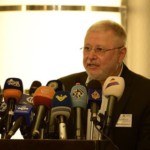
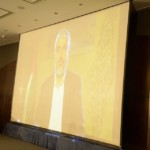
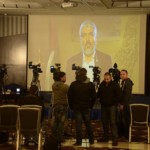
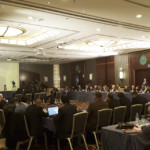
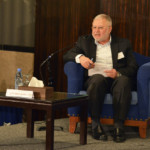
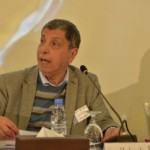
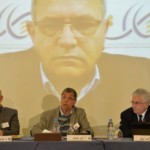
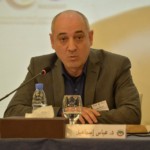
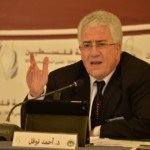
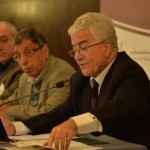
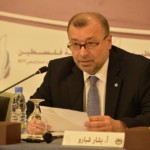
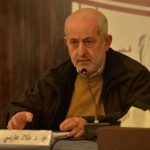
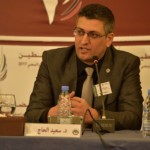
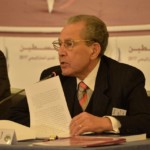
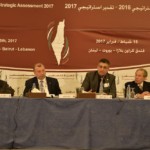
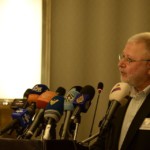

Leave A Comment